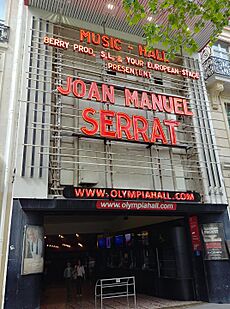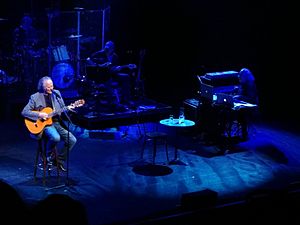Joan Manuel Serrat facts for kids
Quick facts for kids
Joan Manuel Serrat
|
|
|---|---|
 |
|
| Background information | |
| Birth name | Joan Manuel Serrat Teresa |
| Born | 27 December 1943 Barcelona, Spain |
| Genres | |
| Occupation(s) |
|
| Instruments |
|
| Years active | 1965–2022 |
| Labels |
|
| Associated acts | Joaquín Sabina |
Joan Manuel Serrat Teresa (born December 27, 1943) is a famous Spanish musician, singer, and songwriter. He is known as one of the most important modern musicians in both the Spanish and Catalan languages.
Serrat is well-known for turning poems by famous writers into songs. Some of these poets include Antonio Machado, Miguel Hernández, and Pablo Neruda. He was a key figure in a musical movement called "Nova Cançó" (which means "New Song" in Catalan). This movement promoted music sung in the Catalan language. Because of his connection to his hometown, people often call him "El noi del Poble-sec," which means "The boy from Poble-sec."
Contents
Life and Music Career
Childhood in Barcelona
Joan Manuel Serrat was born in a working-class neighborhood of Barcelona called Poble-sec. His father, Josep, was a worker from Catalonia, and his mother, Ángeles, was a housewife from the Aragon region of Spain. His childhood neighborhood had a big impact on him. Many of his songs describe life in Catalonia after the Spanish Civil War, with characters based on people he knew.
How His Career Began
Serrat started playing music when he got his first guitar at age 17. In the early 1960s, he was in a pop band with his classmates. They mostly played songs by The Beatles and popular Italian singers.
In 1965, a radio host helped him get a record deal. He joined a group called Els Setze Jutges ("The Sixteen Judges"). This group's goal was to support the Catalan language at a time when the government of Francisco Franco discouraged its use. That same year, he recorded his first EP (a short album) called Una guitarra. By 1967, he was seen as one of the most important artists in the Nova Cançó movement.
The Eurovision Controversy
In 1968, Spain's national television station, Televisión Española (TVE), chose Serrat to represent Spain in the Eurovision Song Contest 1968. He was supposed to sing the song "La, la, la". However, Serrat insisted on singing it in Catalan, his native language.
The government did not allow this. As a result, Serrat was replaced by another singer, Massiel, who sang the song in Spanish and won the contest. This was the first time Serrat's music came into conflict with the government's language rules.
Fame and Exile
In 1969, Serrat released an album with songs based on the poems of Antonio Machado. This album made him famous across Spain and Latin America. However, some people in Catalonia criticized him for singing in Spanish. Serrat once said, "I sing better in the language they forbid me."
His 1971 album, Mediterráneo, made him a star around the world. The title song is still one of his most famous.
In late 1974, Serrat had to leave Spain and live in Mexico. This happened because he spoke out against the death penalty under Franco's government. He was not able to return home until after Franco's death in 1975.
Later Career and Health
In 1995, the Spanish government gave Serrat a medal for his contributions to culture. Many famous artists, like Joaquín Sabina and Rosario Flores, recorded a tribute album for him called Serrat, eres único ("Serrat, you are unique").
In 2004, Serrat announced that he was being treated for cancer. He had to cancel a tour to have surgery but recovered well. The next year, he was back on tour. His song "Mediterráneo" was later named the most important Spanish song of the 20th century.
In 2006, he released Mô, his first album completely in Catalan in 17 years. He continued to tour and record music for many years, often with his friend Joaquín Sabina. He performed his final tour, "The Vice of Singing," in 2022, retiring from the stage after a long and successful career.
Political Views
Serrat has often shared his opinions on politics. During the 1970s, he criticized the government of Francisco Franco, which led to him being exiled from Spain for a year.
More recently, he has spoken about the independence movement of Catalonia. He has stated that he does not support the movement for Catalonia to become a separate country from Spain. He believes that both the Catalan and Spanish governments have used the issue to distract from other problems. Because of his views, some supporters of independence have called for boycotts of his concerts.
Serrat and Lluís Llach
People often compare Joan Manuel Serrat to another famous Catalan singer, Lluís Llach. During Franco's rule, Llach sang only in Catalan as a form of protest. Serrat, on the other hand, chose to sing in both Catalan and Spanish.
Some people saw Serrat's choice as a way to connect different cultures. Others felt he was giving in to the mainstream Spanish market. Despite their different approaches, both Serrat and Llach are considered very important figures in modern Catalan music.
Selected Albums
- 1967: Ara que tinc Vint Anys
- 1969: Dedicado a Antonio Machado, poeta
- 1971: Mediterráneo
- 1972: Miguel Hernández
- 1981: En Tránsito
- 1983: Cada Loco con su Tema
- 1985: El Sur También Existe
- 1992: Utopía
- 1994: Nadie es Perfecto
- 2006: Mô
- 2010: Hijo de la Luz y de la Sombra
- 2012: La orquesta del Titanic (with Joaquín Sabina)
Major Awards
Serrat has received many awards for his music and cultural contributions. Some of the most important include:
- Gold Medal of the city of Barcelona (2006)
- Medal of Honor of the Parliament of Catalonia (2007)
- Latin Grammy Person of the Year (2014)
- Princess of Asturias Award for the Arts (2024)
- He has also received several honorary doctorates from universities in Spain, Mexico, and Argentina.
See also
 In Spanish: Joan Manuel Serrat para niños
In Spanish: Joan Manuel Serrat para niños
- List of best-selling Latin music artists
 | Mary Eliza Mahoney |
 | Susie King Taylor |
 | Ida Gray |
 | Eliza Ann Grier |



